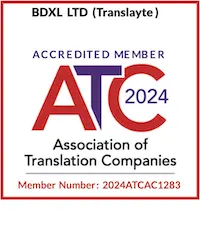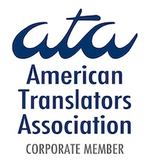Our Certified Translation Services in Ireland
If you're submitting non-English or non-Irish language documents as part of an official application in Ireland, you'll need a certified translation.
Our Ireland document translation services cover a wide range of documents, including but not limited to the following:
- Birth certificates
- Marriage certificates
- Divorce decrees
- Business documents
- Diplomas and transcripts
- Medical records
- Police clearance certificates
- Passports and visas
Ireland does not have an officially regulated system for certified translations like other countries. This means that there are no strict governmental rules specifying who can certify a translation. Translations can either be done by a professional Ireland translator or a translator who is a member of any of these organisations in Ireland; Irish Translators’ and Interpreters’ Association (ITIA), the Chartered Institute of Linguists (CIOL), or the Institute of Translation & Interpreting (ITI).
Beyond standard certification, we also provide Notarised and Legalised (Apostille) translations, which are accepted at Ireland-based institutions.
Why Will I Need to Translate My Documents for Use in Ireland?
You may need certified translations when your original documents are not in English or Irish and you’re required to submit them to Irish authorities, institutions, or organisations. Common scenarios include:
- Immigration and Visa Applications: The Irish Naturalisation and Immigration Service (INIS) may require certified translations of birth certificates, marriage certificates, police clearance certificates, and other supporting documents.
- Irish University and College Enrolment: Trinity College Dublin, UCD, UCC, DCU, NUIG, technological universities (TU Dublin, ATU, MTU), further education colleges, and training providers often request certified translations of diplomas, transcripts, and professional qualifications for admission or recognition purposes.
- Court and Legal Proceedings: Irish courts and solicitors may require certified translations of contracts, affidavits, witness statements, or other evidence for use in legal cases.
- Professional Licensing and Memberships: Applying for professional registration with bodies like the Medical Council of Ireland, Engineers Ireland, the Law Society of Ireland, or the Nursing and Midwifery Board may require certified translations of your qualifications and employment references.
- Medical and Healthcare: Hospitals and healthcare providers may request certified translations of medical records, prescriptions, or test results before providing treatment.
- Financial and Banking Transactions: Banks, tax authorities, and financial institutions may need certified translations of bank statements, tax returns, contracts, or financial reports.
- Business and Public Procurement: Companies bidding for Irish public tenders or submitting proposals may be required to provide certified translations of contracts, proposals, or corporate documents.
- Adoption and Family Matters: In international adoption or guardianship cases, Irish authorities may request certified translations of adoption orders, home studies, or related legal agreements.
What to Do if a Certified Translation is Rejected in Ireland
If your certified translation is rejected in Ireland, the first step is to understand why. Common reasons include translation errors, missing certification details, formatting that doesn’t meet official standards, or using a translator not recognised by Irish authorities.
Once you have the reason, contact your translation provider immediately. At Translayte, we offer a 100% acceptance guarantee. If a translation is rejected, we will correct and reissue it at no extra cost, liaising directly with the authority where needed.
To avoid repeat issues, review the exact requirements of the organisation you’re submitting to. This is because different Irish authorities, such as universities, immigration offices, and courts, may have different standards. In rare cases where a new translation is required, choose a provider recognised by Irish government bodies, with proven accuracy and compliance.
By working with a reputable service like Translayte, which understands Irish certification rules and formats, you significantly reduce the risk of rejection and ensure your documents are accepted the first time.
Official Translation Requirements in Ireland
Although Ireland does not have an officially regulated system for certified translations, many organizations in Ireland will typically expect certain conditions to be met for a translation to be considered certified.
Here are the common requirements:
- Professional Translator: The translation should be performed by a professional translator or a translation agency. The translator or agency should ideally have relevant qualifications and experience, and be a member of a professional body such as the Irish Translators’ and Interpreters’ Association (ITIA), the Chartered Institute of Linguists (CIOL), or the Institute of Translation & Interpreting (ITI).
- Accuracy: The translated document should be a true and accurate translation of the original document.
- Certificate of Accuracy: The translator or agency typically includes a 'Certificate of Accuracy' or a 'Statement of Truth' with the translated document. This is a signed document stating that the translator believes the translation to be a 'true and accurate' representation of the original. The certificate usually includes the translator's name, qualifications, contact information, and the date.
- Format: The translator should try to maintain the format and layout of the original document as closely as possible in the translation.
- Translations of Official Seals/Stamps: Any seals, stamps, signatures, or similar markings on the original document should be noted and translated.
- Translator's Stamp/Seal: Some organizations may require the translation to bear the translator's or agency's official stamp or seal.
In practice, Irish government agencies, academic institutions, and courts accept certified translations from ITIA members, recognised universities, and registered translation agencies.
As a registered translation agency, Translayte produces certified translations that meet these standards and are accepted across Ireland. We have delivered hundreds of translations from multiple languages into English for university admissions, residency, and citizenship applications with our Ireland-based translators verified by the ITIA.
Translations Used Abroad, or at Embassies
If you need to use an Irish-issued document in another country, or submit it to an embassy in Ireland, you may be required to obtain an Apostille on the original document, have it translated, and then have the translation notarised and/or legalised.
Common examples include:
- Irish birth, marriage, or academic certificates required for foreign visa applications
- Educational records for overseas university admissions
- Legal documents for use in international court cases
- Business or corporate records for cross-border trade or company registration
The Irish Department of Foreign Affairs (DFA) is responsible for legalising translations for use in foreign countries. At Translayte, we first have your translation certified by a practising Irish solicitor or notary public, then submit it to the DFA for legalisation. The DFA verifies the solicitor’s signature and attaches an Apostille. Once complete, your legalised translation is shipped to you within Ireland or internationally.
Where Certified Translations are Required
Translayte can provide certified translations in Ireland that are accepted by any of the following agencies and organisations.
- Department of Education and Skills
- Department of Foreign Affairs and Trade
- Courts Service of Ireland
- Irish Naturalisation and Immigration Service
- Ireland’s Health Service
Our certified translations are also accepted by universities, banks, local authorities, courts and foreign embassies based in Ireland.
How Does Our Translation Service Work in Ireland
At Translayte, we pride ourselves in offering online certified translations in Ireland that are straightforward and customer-friendly. Here's how our process works in Ireland:
- Document Submission: First, you must submit your documents to us. You can do this easily through our online platform. We accept a range of file types including PDF, JPG, PNG, and Word.
- Quotation: Once we receive your documents, we'll assess them and provide you with a no-obligation quote. Our pricing is transparent with no hidden fees.
- Translator Selection: If you choose to proceed with our online certified translation in Ireland, we'll assign your project to a qualified professional translator who is an expert in your required language pair and field (for example, legal, medical, technical, etc.).
- Translation: The assigned translator will translate your document, ensuring that it is a faithful and accurate representation of the original. They will also maintain the format and layout of the original document as closely as possible.
- Quality Check: After the translation is complete, it will undergo a rigorous quality check by our in-house team to ensure the highest accuracy and consistency.
- Certification: We'll then certify the translation, affirming that it's a 'true and accurate' translation of the original. The certification includes the translator's credentials and contact details. If required, we can also provide notarization and Apostille services for your translated documents.
- Delivery: The certified translation will be delivered to you via email in a digital format. If you require a hard copy, we can also arrange for it to be posted to your address in Ireland.
- Aftercare: We're committed to your satisfaction. If you have any issues or queries about the translation, our customer service team will be on hand to assist you.
Whether you need a translation for personal or professional purposes, you can trust Translayte to deliver a high-quality service online certified translations in Ireland that meets your needs. Please don't hesitate to get in touch if you have any questions about our process.






















































